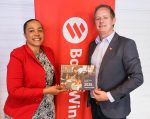The Namibian Competition Commission hosted a stakeholders conference at the Safari Court Hotel & Conference Centre last week pursuant and in terms of section 46 of the Competition Act 2 of 2003, seeking participation from stakeholders on the proposed transaction under review by the Commission involving Heineken International B.V (“Heineken”) // NBL Investment Holdings Limited (“NIH”) and Namibia Breweries Limited (“NBL”) // and Distell Group Holdings Limited (“DGH”).
The proposed transaction entails Heineken acquiring in-scope operations of DGH and a controlling interest in NBL. As an extension and consequence of the aforegoing, NBL will acquire the Namibian operations of DGH (“Distell Namibia”).
The transaction seeks to establish a sustainable competitive landscape throughout Africa, allowing the parties to actively compete against the likes of AB InBev, the worlds largest brewer. With Foreign Direct Investment of close to N$10 billion flowing into Namibia, the transaction is lauded as a major vote of confidence in the country and the region as a whole, and the next step in ensuring that the 100-year-old proudly Namibian business and its brands, continue to grow, as NBL’s full potential is unlocked as part of the larger Heineken construct.
The conference which was widely attended by a multitude of stakeholders, saw indepth presentations being made on the competition and public interest implictions, particularly the economic benefits for the country as a result of the Foreign Direct Investment but also to ensure the sustainability of Namibia Breweries into the future. Economists further highlighted opportunities that would be unlocked as part of the local manufacturing of Distell Brands with a potential retail value of N$1 billion, the development of local supply chains, shareholder value creation, and the enhancement of customer and consumer experiences.
Marco Wenk, NBL Managing Director says: “In the absence of a significant partner, Namibia Breweries currently finds itself in a position where it has to fend for itself both in terms of competition in Namibia as well as beyond our borders. The opportunity to create a combined business with Heineken and Distell will allow NBL to not only benefit from a unique multi-category portfolio which is vital to ensure we are able to respond to changes in consumer preferences, but also to provide consumers with more innovation and choice. This enhanced NBL business, and becoming part of Heineken, the second largest brewer in the world, will allow us to better compete with other global players within and beyond our boarders while creating significant opportunities for our core brands like Windhoek in Africa and beyond.”










